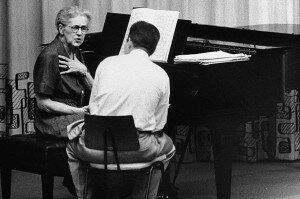
Nadia Boulanger teaching
The composer Philip Glass described her as somewhere “between intimidating and terrifying” whose lessons invariably left students “shaken and silent”, while Virgil Thomson wrote that she had a “no-nonsense approach to musical skills and a no-fooling-around treatment of anyone’s talent or vocation”. But the great teacher Nadia Boulanger was comfortable with her mixed reputation. For her, musical training without rigour had no value, and she was not alone in her attitude.
Boulanger fits the traditional image of the master-teacher – didactic, autocratic, rigorous – and she was not the only teacher who struck awe, fear and reverence in the hearts of her students. Such teachers were – and continue to be – conferred with an almost god-like status.
“Vengerova was insistent on a complete adherence to her approach. For two years I was not allowed to touch a piece of music…..she changed my life, physically at the piano and musically at the same time, without my knowing it was taking place. She was the most profound influence on my life, a remarkable woman.” —Anthony di Bonaventura, pianist
But there’s a misconception here – that teachers of classical musicians have, or should have, very severe personalities, and that they must be scary to be successful and, more importantly, to enable their students to be successful. Ritual humiliation in masterclasses or rapping the knuckles of a student with a ruler whenever they played a wrong note are, fortunately, largely outdated teaching practices which would not be tolerated today where a greater understanding of the psychology of learning and modern pedagogical methods has resulted in a more enlightened approach to teaching and students.
So what is the ‘purpose’ of a music teacher? The obvious response is to instruct, educate and train a student in the skills required to succeed as musician.
The word “teach” derives from the Old English word tæcan which means “to show” or “guide”, and a good teacher will provide guidance/instruction, encouragement, and constructive feedback to their students to enable them to practice and progress. An extension of this is the idea of “guiding” the student in their learning by opening doors, encouraging the student to see the bigger picture beyond the narrow confines of the musical score, and to foster inquisitiveness, confidence and self-determination. In order to transfer their skills and knowledge, a teacher must explain, demonstrate and inspire.
Conversely, a didactic or autocratic teacher who demands that the student adheres to “my way and no other way” can constrict, confuse and ultimately demotivate. Open-mindedness, generosity and humility, the knowledge that, as a teacher, one does not “know everything” and that one is prepared to acknowledge one’s own limitations are all facets of a great teacher.
Rachmaninoff: Morceaux de salon, Op. 10: No. 3. Barcarolle in G Minor
“the great teacher always gave the complete view in music toward the student — not of alternatives, not just one way of doing it…..He gave you the whole picture of many different worlds, many different possibilities…” – Lang Lang on his teacher Gary Graffman
Liszt: Grandes Etudes de Paganini, S141/R3b: No. 3 in G-Sharp Minor, “La campanella”
The revered teacher Gordon Green (who taught concert pianist Stephen Hough, amongst others) said that the aim of the teacher is to make himself “dispensable” to the student. Ultimately, a good teacher should become redundant by enabling their students to become confident, independent learners.
There are of course great teachers on whom the title demigod can be justly conferred. These include the great pianist-teachers of an earlier age – Chopin, Liszt, Busoni, Perlemuter, Kentner, Tureck – whose methods, wisdom and values have been passed down through their pupils, grand-pupils, and great-grand pupils. Such teachers appreciate that a significant aspect of the art of teaching is to create independent, enabled individuals rather than “soundalike” clones of themselves.



